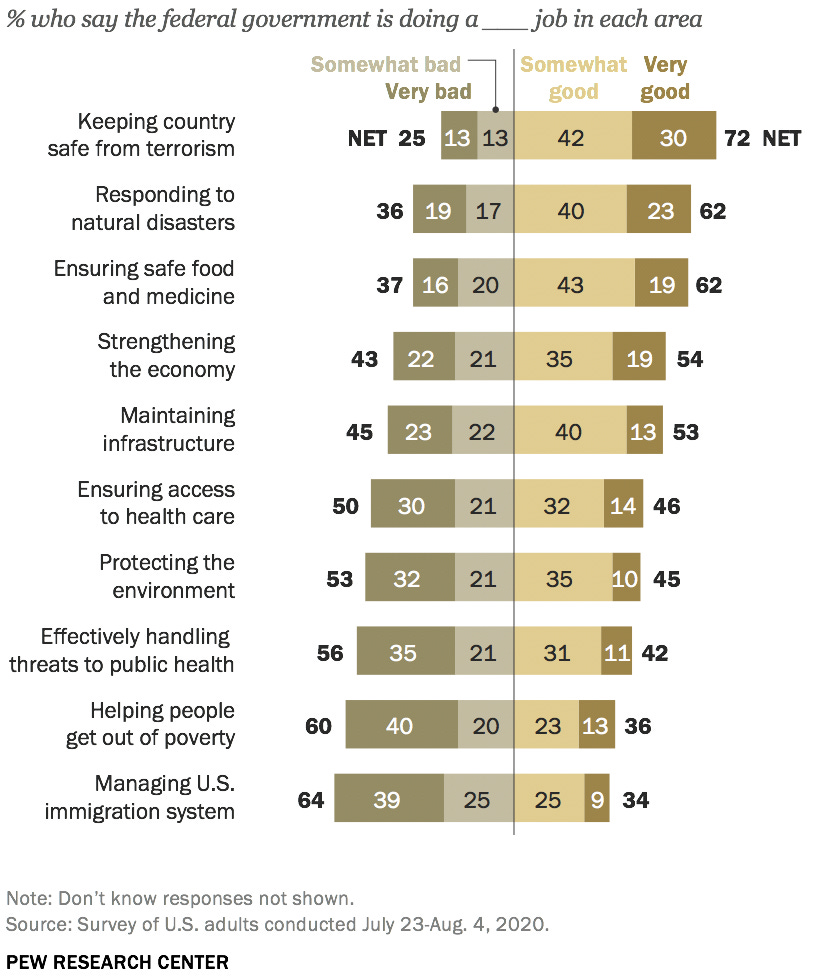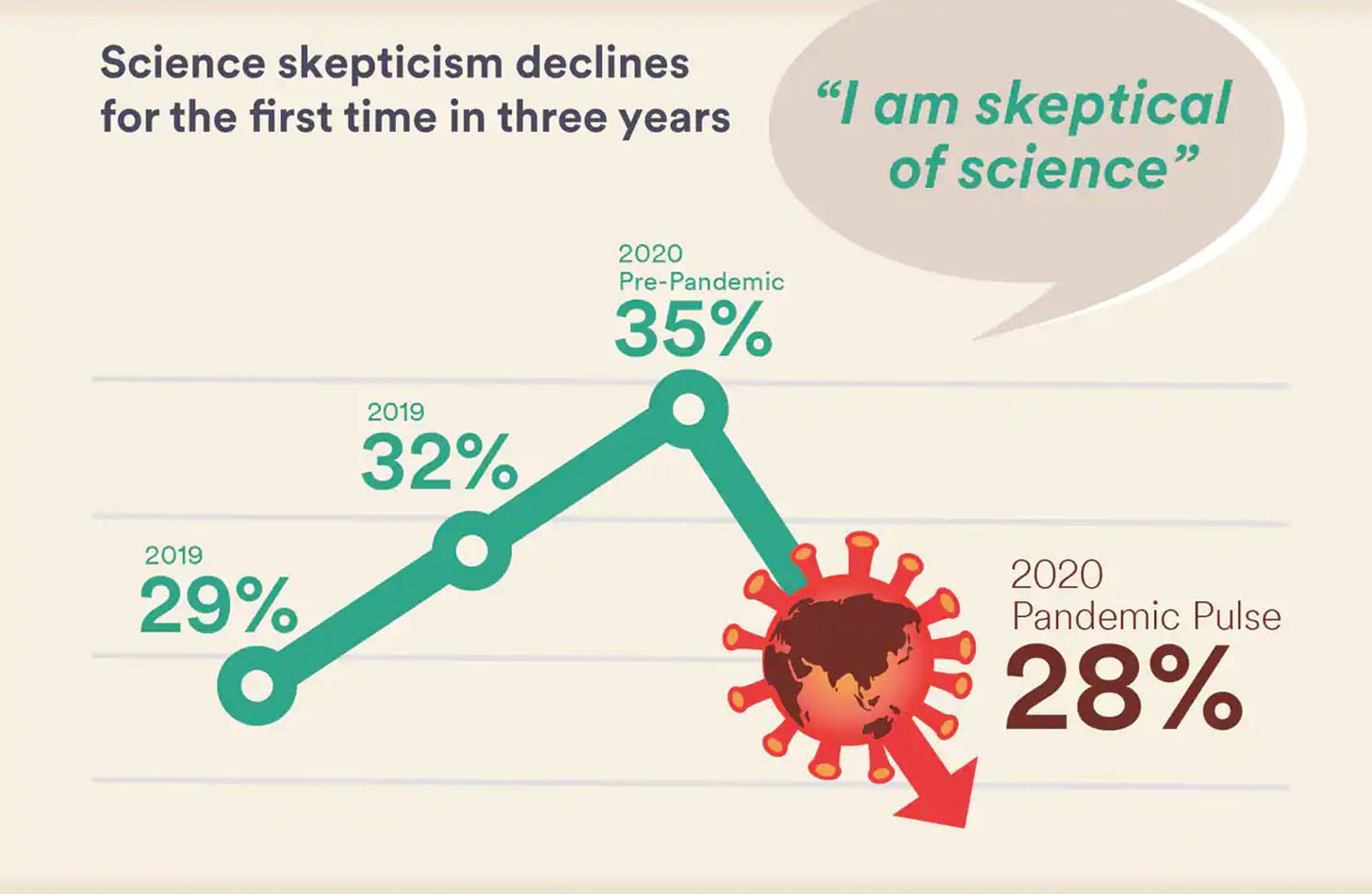Who do we trust?
Exploring trust in institutions, from scientists to the media, the military, elected officials, corporate executives, religious leaders and more.
Society appears to be changing really rapidly and in very profound ways. And for me at least, it can often feel difficult to process all of the changes that are happening. Consequently, I find it helpful to periodically pause, take a step back, and deeply examine what is going on around us.
One of the questions I’ve been wrestling with is what is going on with trust in the world. It feels like every day there is another institution that disappoints us and causes us to lose our trust in it, from government to the media to even scientific institutions. Not wanting to allow my biases and perceptions to pollute my conclusions, I decided to collect some data.
Trust by Institution
To start, here’s an excellent chart from Nature News (repackaging the data from a survey by Pew Research Center) that shows the institutions and groups that U.S. adults trust the most and the least:
As you can see, scientists and the military come out out top, and trust in these groups has increased since 2016. In fact, I find it curious that trust in every major group increased between 2016 and 2019. While elected officials, the news media, and religious leaders have relatively low rates of trust among the public, trust in them is actually moderately rising (at least according to this data from PEW).
Here’s another chart from Scientific American that shows trust in various institutions over time:
Trust in science has mostly been steady and then risen in recent years, while trust in the military has gone up steadily and trust in medicine, education and the press have all declined.
Trust on Covid-19
A more recent analysis was performed by YouGov to explore who people around the world trust most when it comes to covid:
Healthcare professionals top the list in almost every country, with trust rates on Covid-19 generally in the range of 80-95%. Trust in government and the media is mixed around the world and varies from country to country (around 40% in the USA for each). Friends and family, meanwhile, are consistently trusted around the world when it comes to Covid-19 (between 60% and 90%).
Trust in the Media
As we explore the lack of trust in the media in the United States, we see it has been declining over time (according to this survey by Gallup):
We also see that this decline in trust in the media has been driven by Republicans:
Of course, people across the aisle tend to trust the media they consume even despite distrusting the media at large (according to research by Fortune):
Trust in Government
When it comes to trust in the government, this has also been declining steadily over time (according to this survey by Pew Research Center).
Unpacking this, we can see how Americans view the performance of the federal government across various functions:
People believe the government is competent at (1) keeping the country safe from terrorism (2) responding to natural disasters and (3) ensuring safe food and medicine, but they do not believe the government is doing a good job at (1) managing the immigration system (2) helping people out of poverty (3) effectively handling public health threats.
Trust in Science
Moving over to science, this category appears to be performing the best of them all.
For one, skepticism in science has declined for the first time in three years (according to this report by 3M).
Additionally, a strong majority agree that (1) scientists are critical for our future well-being (2) science brings hope for the future (3) science will make life better in the next 5 years:
These are all heartwarming results, and frankly, results that I wouldn’t have expected.
Trust in Religion
In terms of religion, research from Barna shows that athiesm has increased from 5-7% among the last four generations to 13% among Generation Z.
According to Pew, meanwhile, self-identified Christianity has decreased from 84% in the Silent Generation to just 49% of Millenials, while unaffiliation has grown from 10% in the Silent Generation to 40% of Millenials.
This data indicates somewhat of a decline in religiosity and trust in religion.
Trust in Celebrities and Executives
Investigating trust in other groups produced some interesting results.
This question from 3M Research echoes other research showing high trust in scientists and health professionals, but it also shows that only 10% of people have trust in celebrities and corporate executives:
Why are we placing so much value on celebrity endorsements, again?
Trust is Earned
So what can we do to increase trust?
I truly believe that trust is earned.
For example, trust is highest in countries with high GDP per capita and low inequality (as shown by analysis from Our World in Data). This implies that as people prosper together, they have greater faith in one another, while as people diverge massively in opportunity and outcome, they lose faith in one another and in a society that doesn’t serve them.
Additionally, analysis by Pew Research Center suggests that when people in scientific professions take responsibility for their mistakes, are transparent about their conflicts of interest, and provide fair and accurate information, they earn even more trust:
This lesson could be just as equally applied to the media, to elected officials, to intelligence agencies, and to regulatory bodies. The more that these groups admit responsibility for mistakes, are transparent with the public, and provide fair, accurate and unbiased information, the more that people will trust them.
Let’s learn from this data on institutional trust. And rather than attempting to increase trust superficially, let us see how we can reach greater levels of trust by earning it.















